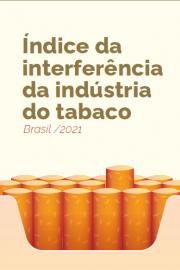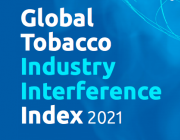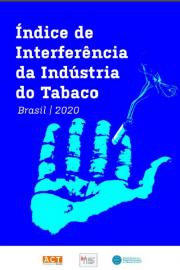
O Índice Global sobre a Interferência da Indústria do Tabaco (TII Índice) é uma pesquisa mundial sobre como as políticas públicas estão protegidas dos esforços subversivos da indústria do tabaco e como os governos têm se protegido contra tal influência. O TII Índice originou-se de um relatório da Aliança de Controle do Tabaco do Sudeste Asiático (Seatca) com apoio da iniciativa Stopping Tobacco Organizations and Products (STOP), cujo significado em português é “Pare as Organizações e Produtos de Tabaco”, da Filantropia Bloomberg, e é parte da publicação do Centro Global para Boa Governança em Controle do Tabaco (GGTC) da Escola para Estudos Globais na Universidade de Thammasat, na Tailândia.
ÍNDICE da interferência da indústria do tabaco. ACT Promoção para Saúde, Rio de Janeiro, 9 dez. 2021. 85p.

Enquanto os governos têm o poder de restringir regulamentos da indústria, infelizmente, o oposto parece ter acontecido nestes tempos difíceis. No muitos países, os governos têm protegido e até promoveu a TI. O tabaco já é o responsável por cerca de 8 milhões de mortes anuais em todo o mundo1 e saúde e as perdas de produtividade custam cerca de US $ 1,4 trilhão todos os anos. No entanto, os governos foram persuadidos a acomodar as demandas e lobby deste prejudicial indústria e aceitar sua caridade, conforme mostrado no Global Índice de Interferência da Indústria do Tabaco 2021 (o Índice).
GLOBAL Tobacco Industry Interference Index 2021. Global Center for Good Governance in Tobacco Control, Thialand, 2021, nov. 2021. 72p.

O Índice Global de Interferência da Indústria do Tabaco (TII Index, pela sigla em inglês) é uma pesquisa mundial que avalia se as políticas públicas estão protegidas dos esforços subversivos da indústria do tabaco e como governos têm se protegido contra essa influência. O TII Index originou-se de um relatório da Aliança de Controle do Tabaco do Sudeste Asiático (Seatca) com apoio da iniciativa Stopping Tobacco Organizations and Products (STOP - em português, “Detendo Organizações e Produtos de Tabaco”), da Filantropia Bloomberg, e é parte da publicação do Centro Global para Boa Governança em Controle do Tabaco (GGTC) da Escola para Estudos Globais da Universidade de Thammasat, na Tailândia.
ÍNDICE de interferência da indústria do tabaco. ACT Promoção da Saúde; Observatório das Estratégias da Indústria do Tabaco do Centro de Estudos Tabaco e Saúde, Rio de Janeiro 2020. 27p.
Objective: To measure the implementation of WHO Framework Convention on Tobacco Control (FCTC) Article 5.3 at country level using a new Tobacco Industry Interference Index and to report initial results using this index in seven Southeast Asian countries.
Methods: Score sheet based on WHO FCTC Article 5.3 Guidelines sent to correspondents in seven Southeast Asian countries, using a scoring system designed with the help of tobacco control experts and validated through focused group discussions.
Results: The seven countries ranked from the lowest level of interference to the highest are Brunei, Thailand, Lao PDR, Cambodia, Philippines, Malaysia and Indonesia. Countries that face high levels of unnecessary interaction with the tobacco industry also face high levels of tobacco industry influence in policy development. Most governments do not allow any tobacco industry representatives on their delegation to sessions of the Conference of the Parties or its subsidiary bodies nor accept their sponsorship for delegates, but most governments still accept or endorse offers of assistance from the tobacco industry in implementing tobacco control policies. Most governments also receive tobacco industry contributions (monetary or in kind) or endorse industry corporate social responsibility activities. Governments do not have a procedure for disclosing interactions with the tobacco industry, but Lao PDR, Philippines and Thailand have instituted measures to prevent or reduce industry interference.
Conclusions: This Tobacco Industry Interference Index, based on the WHO FCTC Article 5.3 Guidelines, is a useful advocacy tool for identifying both progress and gaps in national efforts at implementing WHO FCTC Article 5.3.
ASSUNTA, M.; DOROTHEO, E. U. SEATCA Tobacco Industry Interference Index: a tool for measuring implementation of WHO Framework Convention on Tobacco Control Article 5.3. Tobacco Control, Reino Unido, v. 25, n. 3, p. 313–318, maio 2016.